

Data protection - Better rules for small business. Europe’s new data protection rules export privacy standards worldwide. GDPR Transparency Will Be A Wonderful Thing. Leveraging Privacy as Competitive Advantage. Cynthia is Chair of the firm’s Privacy & Security Practice and a Certified Information Privacy Professional (CIPP).
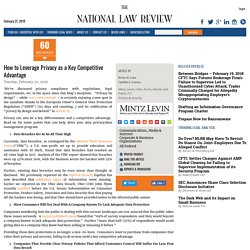
She represents companies in information, communications, and technology, including e-commerce and other electronic transactions. She counsels clients through all stages of the “corporate lifecycle,” from start-ups through mid- and later-stage financings to IPO, and has broad experience in technology and business law, including online contracting issues, licensing, domain name issues, software development, and complex outsourcing transactions. Cynthia has extensive experience in privacy, data security, and information management matters, including state, federal, and international laws and regulations on the use and transfer of information, behavioral advertising, data security breach compliance and incident response, data breach incident response planning, as well as data transfers in the context of mergers and acquisitions and technology transactions.
Research: A Strong Privacy Policy Can Save Your Company Millions. GDPR: How to Make it a Competitive Advantage. Under the shadow of GDPR, it’s easy to understand why companies are concerned about a regulation with the potential to have such a profound impact on their business. The GDPR represents a huge shift in the way businesses will be expected to handle data, and non-compliance with the regulation can potentially incur fines of up to 4% of global turnover. In meeting the requirements of GDPR, organizations will be expected to overcome several unique obstacles: getting to grips with completely overhauled data subject rights; hiring a suitable Data Protection Officer (DPO) despite a perceived skills shortage in this area; and creating and maintaining detailed internal records of data protection activities. But for all of the challenges of GDPR there are opportunities in equal measure. A company can actually derive competitive advantage from the regulation if preparation is approached in the right way.
But this fact isn’t universally recognized yet. So, are you an “obstacle” or an opportunist? GDPR Advantages. Stop Dragging Your Feet: GDPR Compliance Can Make You More Competitive - Corporate Compliance Insights. The May 2018 deadline for the EU’s General Data Protection Regulation (GDPR) should have organizations scrambling to roll out GDPR-readiness programs.
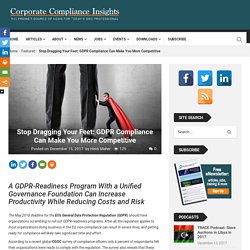
After all, the regulation applies to most organizations doing business in the EU, non-compliance can result in severe fines, and getting ready for compliance will likely take significant time and effort. According to a recent global CGOC survey of compliance officers only 6 percent of respondents felt their organizations were ready to comply with the regulation. The survey also reveals that these organizations face many other data protection and management challenges. This article discusses the findings of the survey. One possible explanation for the lack of progress – as suggested in the survey data – is that many executives are too focused on day-to-day operations to worry about preventing a potential compliance problem down the road. Most Organizations Are Missing the Boat GDPR, Unified Governance, and Increased Competitiveness. Viewing GDPR as an Opportunity to Drive Competitive Advantage and Create Digital Trust.
The European Union’s General Data Protection Regulation (GDPR) is scheduled to come into effect in May of 2018.

While this is a regional regulation, the nature of today’s interconnected economies means that it has global implications. GDPR for Data Processors: How to Create Commercial Success for Your Business - DPOrganizer. McAfee Report: Companies will Move Data to Europe for GDPR Compliance - Compliance Junction. The latest research published by McAfee reveals that 48% of organizations are likely to move their data to new locations due to General Data Protection Regulations (GDPR).
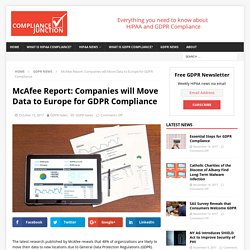
The majority of the survey participants feel that implementation of the new law will make Europe the global leader in data protection. However, the study indicates that 50% of the organizations consider the US as the most popular data storage destination. The modern-day Information Technology landscape has enabled the storage of information across several platforms and locations. GDPR will force up cyber security standards – Europol - Insurance Age. GDPR laws drive innovation rather than restrict it. The impending General Data Protection Regulations coming out of the European Union expand to all global companies that service customers in Europe.
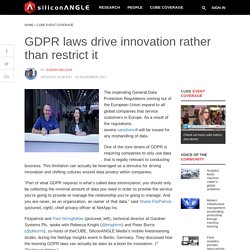
As a result of the regulations, severe sanctions will be issued for any mishandling of data. GDPR is everyone's responsibility. It’s less than a year until the General Data Protection Regulation (GDPR) comes into force, and public sector organisations need to be able to hit the ground running in complying with its demands.

There is no avoiding it. RGPD : l’opportunité de lutter contre le shadow IT. Et si le RGPD était ce qui était arrivé de mieux au DSI depuis longtemps ?
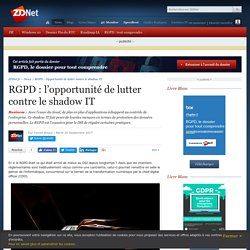
Alors que les chantiers réglementaires sont habituellement vécus comme une contrainte, celui-ci pourrait remettre en selle le patron de l’informatique, concurrencé sur le terrain de la transformation numérique par le chief digital officer (CDO). Ces dernières années, et surtout depuis l’essor du cloud, le DSI a été court-circuité dans des décisions qui relèvent pourtant de son pré carré. Les solutions en mode SaaS déployées sous le radar de l’IT se sont multipliées contournant les règles de sécurité corporate. Selon une étude d’IDC, 61% des projets informatiques sont aujourd’hui financés par les directions métiers et, dans 17 % des cas, l’IT n’est même pas tenue au courant. Au regard des sanctions envisagées, le RGPD fait clairement de la « privacy » un enjeu d’entreprise et le DSI peut trouver là l’occasion du lutter contre ce « shadow IT » ou plutôt ce « shadow cloud ».
Recenser les applications « hors la loi » Why GDPR is an opportunity.